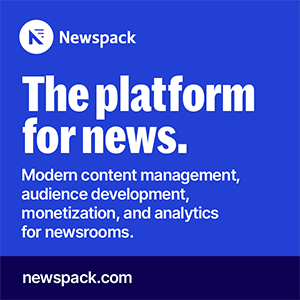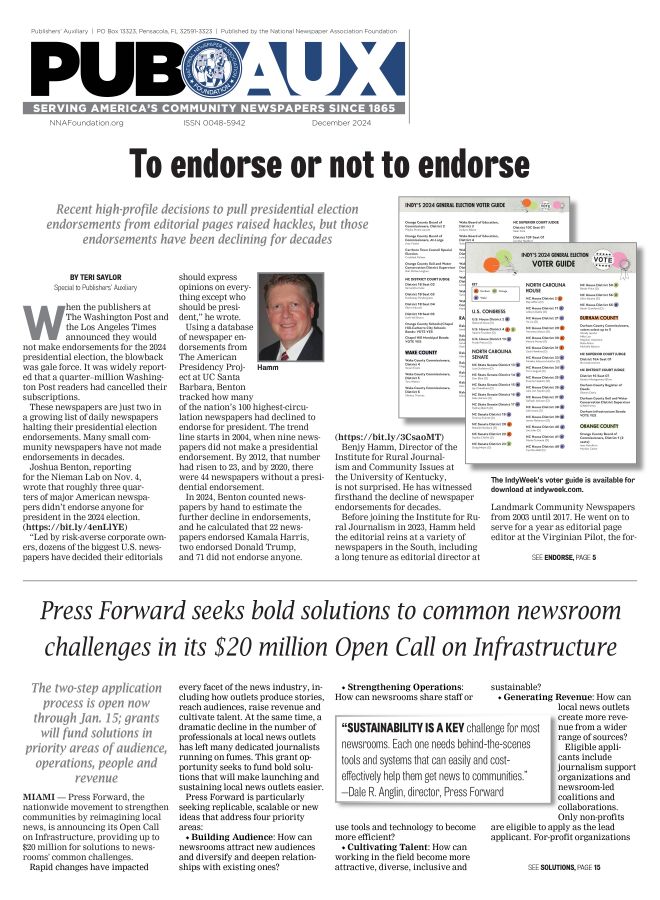WA paper works to monetize its Facebook page
Mar 13, 2017
By Chris Thew
Special to Publishers’ Auxiliary
OMAK, WA—We recently started upping our game at The Omak-Okanogan (WA) County Chronicle in terms of video, launching a weekly newscast that includes local news, weather and sports, but we were lacking one important thing on our Facebook page—advertising.
Facebook’s policy doesn’t allow sponsored or branded content unless you have a blue check mark next to your name, so several months ago I started looking for links to ask for the coveted badge. Pages with the blue checkmark, according to Facebook, are the only ones able to include sponsored content on their Facebook pages. Barring that, you are taking your page’s future and existence in your hands if you do advertise without it. All it takes is one disgruntled reader to report the violation.
If your paper has put in repeated requests like we had and heard nothing back, there is a reason.
I attempted to contact Facebook several times during that period to no avail, so I turned to newspapers around the world on Facebook with fewer likes than our page that had earned the mark—some with as few as a few hundred. All of them that responded said that they had made the requests much earlier than we had. It’s never fun to be late to the party.
Figuring other newspapers must be in the same boat, I contacted Pub Aux Managing Editor Stan Schwartz to see if he had any clues.
I searched the Facebook profiles of National Newspaper Association member papers to see what others had for verification and likes. I found that only a small minority of these newspapers has a blue check mark—about 4 percent. And some of them have only a few thousand page-likes. Only about 20 percent have any verification at all—not including the hundreds of papers without a Facebook presence.
I looked through all the pages one-by-one and jotted down notes on ideas we can replicate at The Chronicle. There are many newspapers that are doing impressive things with video and other tech, but Facebook’s corporate staff just hasn’t noticed them.
After repeated attempts to contact a living, breathing person at Facebook over this issue, I was finally able to talk to three people from various departments. All of them said that the old verification system forms, which can still be found in several locations, are no longer being used.
One employee told me that Facebook’s policy concerning verification was only focused on “huge corporations and celebrities.” He even said that was the message they were given from above.
For a few days, I was pretty upset. I’ll admit I was a bit miffed that the company that says they care would have that kind attitude about newspapers when they are constantly talking about the need for real news.
I received a callback from the same Facebook employee a couple days later. I had sent a message questioning why Facebook wouldn’t care about community newspapers, some having served their communities for more than 150 years. I’m not sure if it played a part, but he had taken my words to heart. He still had a grim outlook on our chances for getting the coveted blue check mark, but added that the only way for pages to be approved was if someone at Facebook found them and felt they were worthy.
Another response from Facebook—without any individual signature—quickly gave us the brushoff. It said that we didn’t meet the criteria of a “public figure, media company or brand.” That was news to us and I’m sure would be to other newspapers that have been publishing non-stop for more than 100 years.
But one of my requests was still out, and the response from that Facebook staffer was uplifting, to say the least.
Within a day, we were blue check verified.
I was told by the spokesperson that asked for anonymity that the company was working on a new form system, which will be in place soon.
What can papers do now?
First, newspapers should get initial business verification. The gray checkmark provided by Facebook says that your newspaper is a legitimate business and that it is your page. Every newspaper should be at this point. If you don’t have that, Facebook likely would never discover your page and verify your presence. The other huge benefit is that the initial verification will put you higher in search results on Facebook for free. All it takes is either an automated call to a line that is identified as your business or sending in supporting documents. You can find it in the Settings area on your Facebook page, under the General tab.
Second, join the “News, Media and Publishing on Facebook” group on Facebook. The closed group is the first place to find out about Facebook local meetings, technology innovations and to get tips from other professionals on what they are doing to attract readers. It will also likely be one of the first places to learn about any changes to the verification process for media companies. Need to ask a question? Experts from major dailies, magazines, TV stations and publishing houses are more than happy to help a fellow journalist. Just make sure that your journalism job is listed in your Facebook employment history. (The group is for journalists and media professionals.)
Other things that Facebook suggests:
Facebook recently offered up a slew of free courses specifically catering to journalists and offering tips and tricks on how to grow your reader base and make some revenues on the social media giant.
Facebook.com/journalists offers courses on engaging your audience, Instagram, Instant Articles (which any newspaper can use advertisements with) and Facebook 360. © Chris Thew 2017
Chris Thew managing editor for the Omak-Okanogan County Chronicle in Omak, WA. He can be reached at CThew@OmakChronicle.com.







